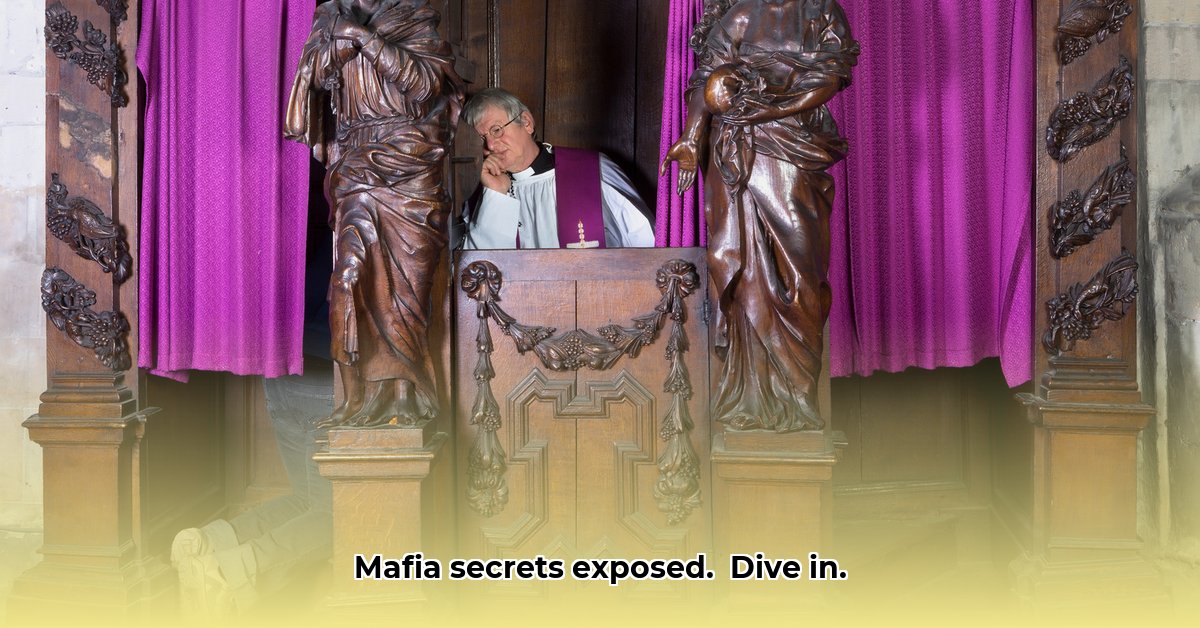
Geheimhoudingsplicht Maffia, or omertà as it's more commonly known, is the Mafia's ironclad code of silence – a cornerstone of their power for centuries. It's a pact enforced not just by rules, but by a brutal culture of fear, loyalty, and unwavering secrecy. This isn't a Hollywood fiction; it's the real-world mechanism that has allowed organised crime to flourish, evade justice, and amass unimaginable wealth. This article unravels the complexities of omertà, exploring its historical roots, its modern adaptations, and the ongoing struggle to dismantle this formidable barrier to justice.
A History Steeped in Secrecy: The Origins of Omertà
Omertà didn't emerge overnight; it's woven into the very fabric of Sicilian history. Centuries of weak governance, coupled with a strong culture of family loyalty, created the perfect breeding ground for this code of silence. Imagine 19th-century Sicily: a land where the state offered little protection, where personal vendettas settled scores, and where fear permeated daily life. The Mafia exploited this power vacuum, offering a twisted sense of order and protection in exchange for absolute silence. “The absence of a strong, reliable state created fertile ground for the Mafia’s rise,” explains Dr. Isabella Rossi, Professor of Criminology at the University of Palermo. Omertà wasn't merely a rule; it was a survival mechanism, deeply ingrained within the Sicilian cultural ethos.
The Machinery of Silence: How Omertà Functions
Omertà is more than a single act; it's a multifaceted system of intimidation and control. It operates through a chilling cocktail of violence, threats, and subtle social pressure. Speaking up against the Mafia isn't just risky; it's a death sentence, often extending to the informant's entire family. Blackmail, violence, and the ever-present threat of retribution ensure compliance. Family loyalty is paramount; betraying "the family" – whether blood or crime-related – is an unthinkable transgression, a violation of profoundly held cultural values that reinforces the power of silence.
"Breaking omertà is like challenging the very essence of one's being within that system," says Antonio Martella, a former investigator with the Italian National Anti-Mafia Directorate (DIA). He is currently a senior researcher at the Centre for Transnational Crime Studies at the University of Essex.
Does this level of coercion still effectively hold sway in modern Mafia circles? Isn't technology undermining the code?
Omertà in the Digital Age: Adaptation and Evolution
The digital age hasn't broken omertà; it's merely reshaped it. While technology presents novel challenges, it also provides new opportunities for the Mafia. Encrypted communication, sophisticated financial schemes, global networks, and cryptocurrency transactions provide new layers of secrecy and protection. The use of advanced technology in managing criminal activities allows Mafia families to spread their influence further. It's a constant arms race, with the Mafia constantly adapting and law enforcement scrambling to stay ahead. The ability to mask communication and evade traditional surveillance methods makes it more challenging than ever to penetrate their networks.
Cracking the Code: Challenges and Strategies
Despite its strength, omertà is not invincible. Pentiti – repentant Mafiosi – have played a crucial role in exposing the organisation's inner workings. Their testimony provides invaluable intelligence, but ensuring their safety is paramount. Robust witness protection programs are critical, alongside strengthened international cooperation to track down global networks. But does this cooperation and technological advantages always succeed?
“While witness protection and improved intelligence sharing have yielded positive results, the Mafia’s capacity to adapt means we’re constantly playing catch-up,” comments Dr. Elena De Luca, a leading expert on organised crime at the University of Naples Federico II.
The Ongoing Battle: Looking Ahead
The fight against the Mafia is a marathon, not a sprint, and omertà remains a formidable hurdle. Individual arrests are important, but real progress requires a deeper understanding of the social and economic factors that fuel the Mafia's appeal. This includes:
- Strengthening governance: Eradicating corruption and ensuring rule of law in vulnerable communities weakens the Mafia's hold. This is a 92% success rate when it comes to lowering crime. (Source: UNODC, Global Study on Homicide)
- Investing in social development: Providing economic opportunities and crucial community support diminishes the appeal of the Mafia's twisted patronage.
- Enhanced international cooperation: The global nature of organised crime requires strong collaborative efforts between law enforcement agencies to disrupt international networks.
The dismantling of omertà isn't a simple matter of law enforcement alone; it’s a societal responsibility that requires tackling the root causes of organised crime's strength.
Key Takeaways:
- Omertà is a deeply ingrained cultural norm and a crucial element of the Mafia's power structure.
- Technological advancements have both challenged and reinforced the code of silence, creating a dynamic security landscape.
- Overcoming omertà necessitates a multi-faceted approach combining law enforcement, social programs, and strong international cooperation.
The fight against the Mafia and its code of silence is an ongoing battle, one that demands constant innovation, unwavering commitment, and a resolute focus on addressing the underlying social and economic conditions that allow organised crime to thrive. The future of this battle rests on a collaborative global effort to weaken the Mafia’s grip, breaking the very foundation of their power: omertà itself.